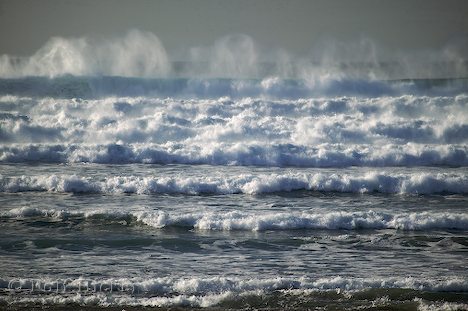Virginia's largest city may get up to 45,000 acres smaller over the next century, due to an anticipated 2.3 to 5.2 feet of relative sea-level rise expected in Virginia Beach – a rise that would also impact the entire Hampton Roads region and the Eastern Shore.
Recognizing the challenges this will pose, the University of Virginia's Institute for Environmental Negotiation is assisting citizens and decision-makers in long-range planning.
Under director Frank Dukes, associate director Tanya Denckla Cobb and graduate associate Melissa Keywood – all from U.Va.'s School of Architecture – the institute is working to develop awareness of, and strategies to face, rising sea levels.
Beginning in March 2011, the institute established partnerships with the Hampton Roads Planning District Commission, Wetlands Watch and the city of Virginia Beach to host four listening sessions for Hampton Roads and Eastern Shore citizens to share their experiences of sea-level rise and ideas for confronting it.
Following these gatherings, the institute has been working with its partners to synthesize its findings and develop recommendations for action. On Tuesday, it released a report on a May 9 session in Virginia Beach, at which the institute facilitated a meeting of a diverse group of 15 regional stakeholders. There, the project partners sorted through 56 potential policies and chose the five most important, and relevant, policy categories for Virginia Beach, discussing in detail the costs and benefits of each category.
These included preparing educational materials, tools and online programs; the use of transfer or purchase of development rights; reasonable restrictions and rolling easements; special tax districts for improvements; and updating the zoning code to prepare buildings in vulnerable areas.
"I feel strongly that planners need to play a pivotal role in helping communities prepare for these difficult challenges. However, this is not an issue we can address with traditional planning tools, like zoning, alone," said Keywood, who developed the coastal listening sessions (for which she earned the National Oceanic and Atmospheric Administration's Walter B. Jones Award for Excellence in Coastal and Ocean Management in June).
Nearly 200 citizens and elected officials turned out June 13 for a Coastal Flooding Workshop in Melfa on Virginia's Eastern Shore. Denckla Cobb, the project coordinator, said the turnout was "record-breaking," and remarked on participants' enthusiasm and desire for local government to boost its involvement in education and outreach regarding rising sea levels – a sentiment also heard in Virginia Beach.
A vast majority of the Melfa participants said they had noticed changes in wetlands and beaches, she said. "They know that rising sea levels are having real impacts, such as causing more frequent flooding during storm events. It's also clear that people want more information, not just about what's happening and why, but also about specific ways communities can prepare for sea-level rise."
"It was clear that people were very interested in catalyzing action to implement new policies to address this concern," said Keywood, who earned her master's degree in urban and environmental planning.
According to a survey taken in Virginia Beach, people considered themselves fairly knowledgeable about sea-level rise and its potential consequences, ranging from wildlife habitat concerns to potential road blockages.
"Participants in our workshops are very in tune with their local environments and are acutely aware of the changes they've observed over time in regards to habitat loss, shoreline erosion, business loss and others," Keywood said.
Nevertheless, Denckla Cobb saw that many were less aware of strategies and tools they could implement on an individual or local level – reinforcing the need for the institute to play a role in facilitating the development of practical solutions.
Sea-level rise is a "multifaceted issue for which there are not a lot of practical, usable tools, unless political will changes," she said, adding, "There is a difference between knowing what is needed and getting it done."
In addition to the efforts of the institute, Virginia Sea Grant has funded graduate student fieldwork in Hampton Roads as part of architecture professor Timothy Beatley's "Climate Change and Coastal Planning" course. Its final report focuses on adaptation and accommodation as ways to mitigate sea-level rise, specifically through strategies of land use and growth management, resilience and knowledge dissemination.
Since 1980, the Institute for Environmental Negotiation has worked throughout Virginia to mediate natural and man-made environmental issues, such as remediating coal mines, revitalizing tobacco farms and mitigating sea-level changes. For more on its Community Resilience in Coastal Virginia initiative, including the new focus group reports, visit its website.
Media Contact
Article Information
August 21, 2012
/content/uva-institute-assists-citizens-sea-level-rise-issues-virginias-coast

